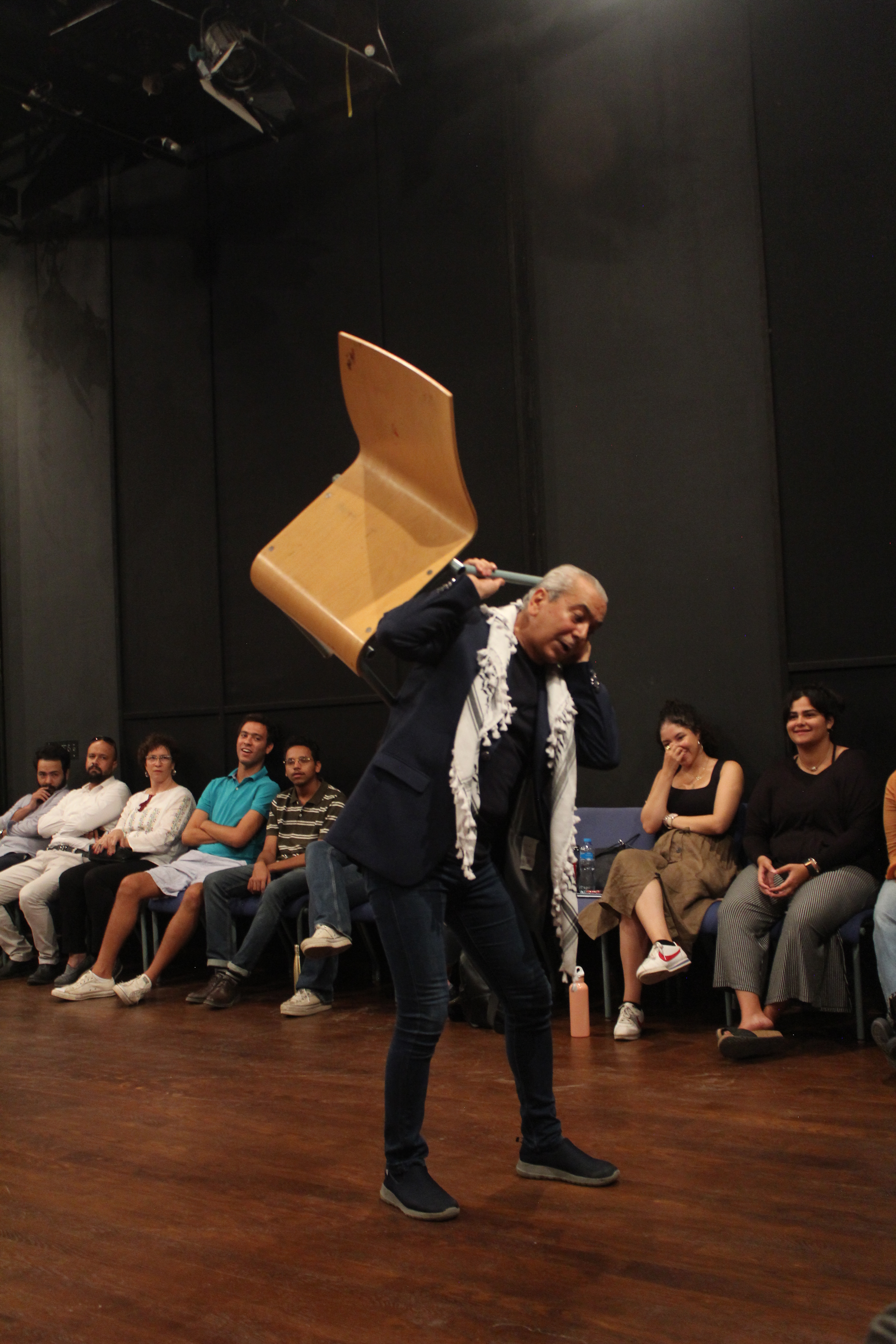By Tarneem Wanis
“All Arab countries are my countries, but my home country isn’t,” cried out Ghannam Ghannam as he performed his one man production I Will Die in Exile at the black box room of the theater department at AUC.
Ghannam, who runs the theater program at the Arab Theatre Institute in Sharjah, UAE, wrote, directed, and performed the story of a Palestinian in exile.
The monodrama was sponsored by Professor and Director of the Theatre Program Jillian Campana and Director General of Cairo International Festival for Contemporary and Experimental Theatre, Dina Amin.
For about an hour, Ghannam reassembles his life story in a piece of art that is made to be performed by only him. It’s an autobiographical show in which everything is true and where its success depends on Ghannam’s authentic first-hand delivery.
He first takes us back to his childhood and Palestine’s geography which evolves as he grows. As Ghannam’s growth is an archive of politics and history, I Will Die in Exile gradually becomes a tale of the entire Arab nation and specifically the Palestinian community.
“Ghannam embraces the quintessential Arab performer. His show is tremendously painful, yet it is also cathartic and liberating,” said Amin
The audience watch as he bears his suffering, expressing it, screaming it and reforming it into an artwork. In doing so, he invited the audience to contemplate their own stories, their own histories and their own pain.
I Will Die in Exile showcases the revival of the traditional Arabic storytelling tradition; Ghannam performs solo and transforms the stage into a documentation of memories.
With no special lighting, sound or any special effects used, he takes the audience on a journey of his life as he recalls his family’s Palestinian history. The monodrama expresses the persecution that Palestinians deal with at airports, border lines and different checkpoints.
Ghannam used only a chair as he moved around the circular space of the room and directly interacted with audience members. He invited the spectators to engage and react freely, evoking the perfect atmosphere for his production.
In turn, the audience were slowly discovering the blurry line between reality and performance art as Ghannam greets and invites them into his own personal life.
His introduction is a piece of the show and where the audience gets to rehearse becoming Ghannam’s friend. Unlike in other plays, the audience were watching a theatrical performance in which they were acknowledged as fellow humans in a bond with the actor.
“I believe that students need some education about Palestine because in the past 30 years something was lost in the cultural connection between the generation and the Palestine crisis,” said Amin about bringing I Will Die in Exile to an AUC audience.
During the performance, Ghannam buries his father and his two brothers by which he turns the showcase into a funeral where he grants his family members their political and historical honor and rights. In the last scene, Ghannam envisions and acts his own burial, a scene of alarming and heightened emotions as the actor acts out his own visualized death.
“His eyes close and he sucks himself into a deeper place to cope. An aura of tensity filled up the theatre. Tears started running down the audiences’ eyes as grief and pain piled up in an expression of what is called appraisal on injustice,” described Yasmine Kamel, one of the audience members and an AUC Graphic Design major.
Ghannam acknowledges that his human story is inspiring, powerful and at once provoking.
“It’s evocative… to figuratively transform the entire show space into a cemetery. The production suddenly becomes a non-literal graveyard in which all those who died in the journey of political battle are buried,” said Ghannam.
He ended his piece by indirectly acquainting the audience with the notion that people can only retrieve their countries in the tombs where their place of birth is carved.
“We can only belong again in death,” he said.
